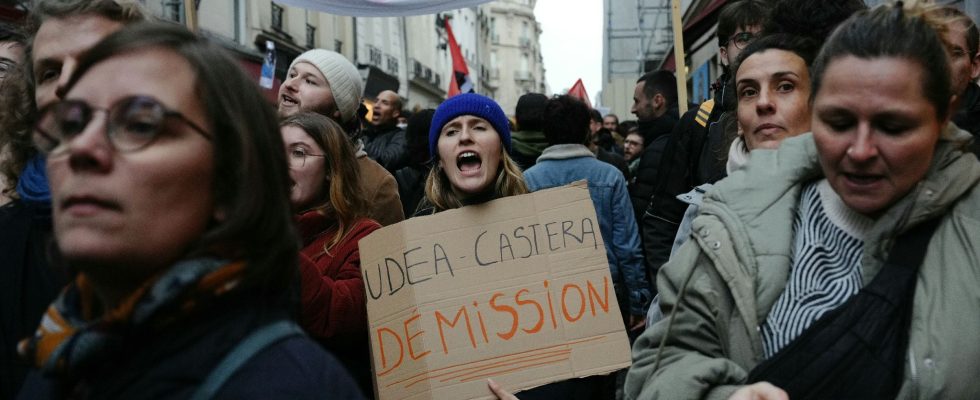After a first day of mobilization described as a “success” last Thursday, the National Education unions are back on track this Tuesday, February 6. The Snes-FSU, the CGT Educ’action and Sud Éducation are once again calling on National Education staff to strike. Increase in salaries, “shock of knowledge” wanted by the government, Amélie Oudéa-Castéra controversy… L’Express takes stock of what you need to know before this second day of a mobilization which could well take root in the long term .
Who is calling for a strike?
As during the first day of the strike, the mobilization is led in particular by the Snes-FSU, the main union in middle and high schools, as well as by the CGT Educ’action and Sud Education. Meeting as an inter-union last Friday, the three unions “called on staff to make the week of February 5 a week of action in Education and to strike on Tuesday”.
The third union, the FNEC FP-FO, which did not sign the inter-union press release, announced that it had “filed strike notice until March”, and assured that it will support “all initiatives taken for the satisfaction of demands (renewal of the strike, blocking of schools, rallies, delegations to carry demands, etc.)”.
The Sgen-CFDT, the 4th national education union, which had called and participated in the strike on February 1, this time did not call for a new day of mobilization on February 6. Not because she does not support the movement, but because “the notice period for school teachers was not tenable” and “the risk is great of showing a weakening of the movement of opposition to the deleterious educational policy of the shock knowledge.”
What demands?
The movement’s demands remain the same as on the first day of the strike. First of all, there is the question of remuneration. “The salary file cannot be closed: the measures taken do not even allow the losses of recent years to be made up for,” denounced the Fnes-FSU, while the CGT Educ’action demands “the abandonment of the Pact in benefit from an unconditional salary increase.
The reform of the “clash of knowledge”, and in particular the establishment of “level classes” promised by Gabriel Attal during his brief stint at National Education, is also in the crosshairs of the unions. In its press release, the Fnes-FSU denounced a reform which “draws the contours of a backward-looking and conservative school”. “Through the level groups, it is the School of social sorting that is being set up,” continues the main union. Same slogan from the CGT Educ’action, which “also deplores the outdated vision of the school, illustrated by the desire to put in place the unique outfit and the generalization of the SNU”.
The Oudéa-Castéra malaise
His personal case will have done nothing to calm the anger of the unions. The Minister of National Education Amélie Oudéa-Castéra, whose controversies have largely punctuated political and media life since her appointment at rue de Grenelle, is particularly targeted by the teachers’ movement.
“Amélie Oudéa-Castera’s comments, denigrating public schools and their staff, show the extent to which national education is despised by the power in place,” criticizes the CGT Educ’Action, while Sud Education considers that “the class contempt of the minister ignited the powder.” For its part, the Fnes-FSU points out that “on February 1, staff widely denounced the minister’s contempt for public schools but also the policies which organize a form of educational and social separatism”.
Since last Thursday, a new element has further weakened the situation of Amélie Oudéa-Castéra: the resignation of the rector of the Paris academy Christophe Kerrero, one of the highest executives in National Education, against a backdrop of disagreements with the minister on a reform of preparatory classes.
What mobilization expected?
Last Thursday, 20.26% of teachers were on strike, according to figures from the Ministry of National Education. The Snes-FSU, for its part, estimated the rate of strikers in middle and high schools at 47%, while the FSU-Snuipp, the main primary union, counted 40% of strikers in nursery and elementary schools.
At the same time, several thousand teachers and education staff demonstrated in Paris and major cities in France to raise awareness about their working conditions. It is difficult to estimate whether the figures will be of the same magnitude this Tuesday, even if the very strong anger of the teaching staff seems well anchored.
